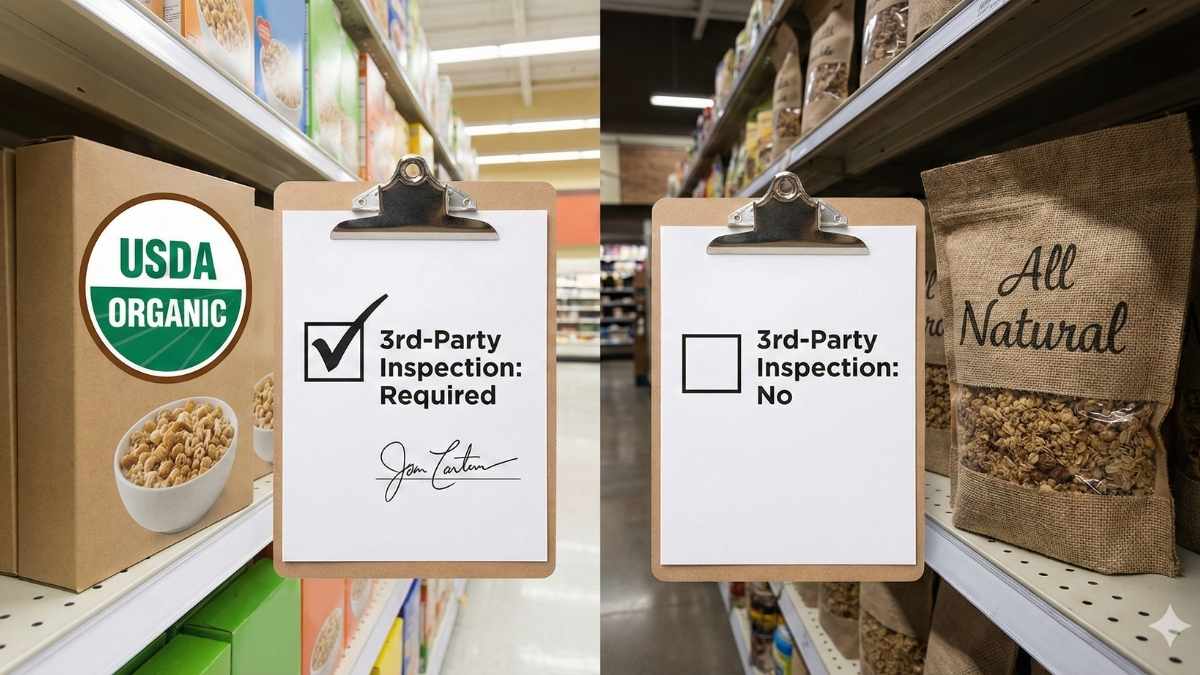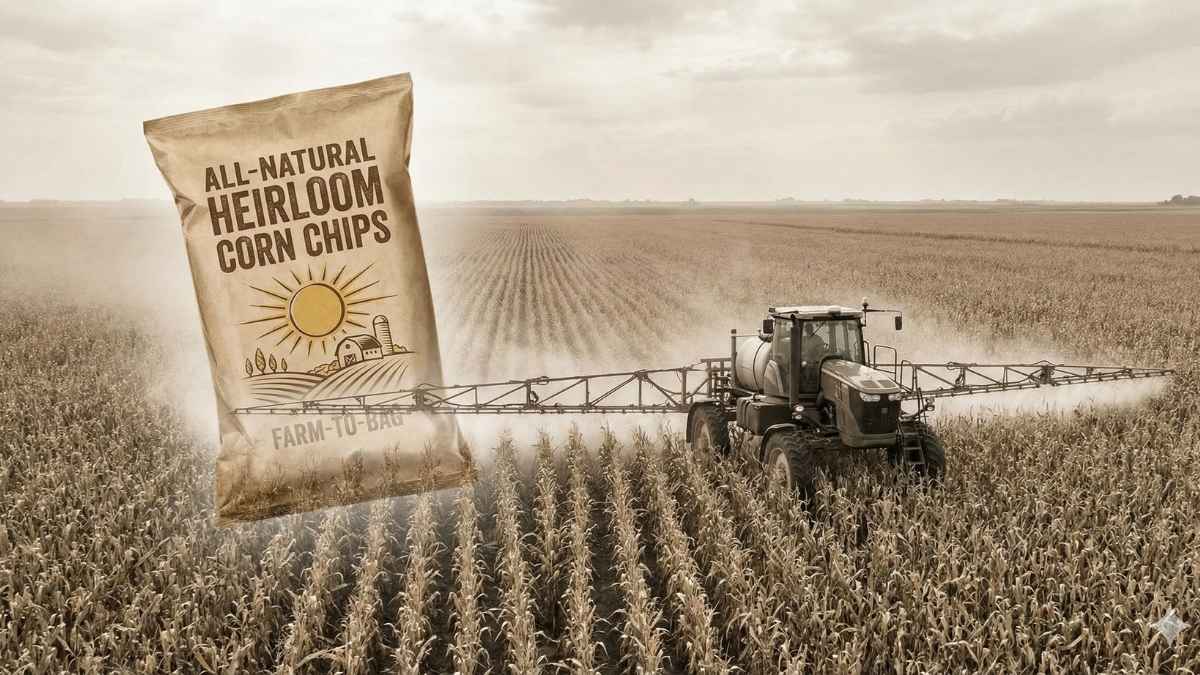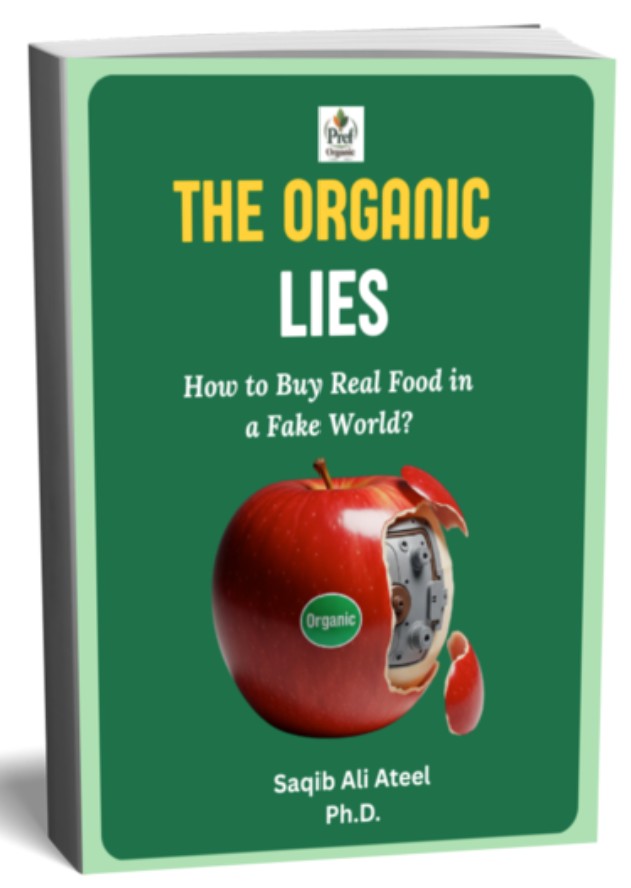Natural vs. Organic Food: A PhD Farmer's Guide to
Spotting the Gimmick 🌿
The natural vs organic food debate begins for most of us in the same place: standing in a grocery store aisle, feeling a quiet sense of pressure. In your left hand, you hold a box with the official green and white "USDA Organic" seal. On your right, a beautifully packaged product with earthy colors and rustic font that proudly declares it’s "All Natural." It might even be a little cheaper.
You want the best for your family. But in this moment, you’re frozen by a high-stakes question: Am I being tricked?
As a PhD scholar who has spent a lifetime with my hands in the soil—from my family's farm to the organic vegetable garden I tend for my own kids—I see this confusion all the time. It’s chaos by design. But I’m here to be the calm in that chaos.
Let’s end this debate for you, right here and now. We're going to take these two labels out of the confusing "basket" of supermarket claims and put them side-by-side. By the end of this article, you will have the confidence to know exactly which one is a promise and which one is just a pretty story.
Quick Verdict: Your Supermarket Superpower
- Organic is a Promise with Rules: The "USDA Organic" seal is a legally protected guarantee backed by strict federal regulations and annual third-party inspections.
- "Natural" is a Story with No Rules: For most foods, the term "natural" is unregulated, undefined, and legally meaningless—it's a marketing word, not a standard.
- The Forbidden List: Organic standards strictly prohibit synthetic pesticides, GMOs, and (for meat/dairy) antibiotics/growth hormones, focusing instead on active soil health and preventative care.
- The Bottom Line: A "natural" label gives you zero guarantees; a "natural" product may still contain crops sprayed with synthetic pesticides or grown from GMO seeds.
- Final Takeaway: Stop trusting the marketing story and start looking for the verified promise of the seal to gain confidence in your food choices.
The "Basket of Clarity": Placing the Labels
Side-by-Side 🧺
To truly understand the natural vs organic food comparison, we have to treat them like two completely different species. One is based on a transparent system, and the other is based on a feeling.
What Does "Organic" Actually Mean? The Promise
in the Seal ✨
When you see that green "USDA Organic" seal, it’s not just a sticker. It is the end result of a long, legally defined process. It’s a guarantee.
Think of it like a rulebook for farming that a referee (a USDA-accredited certifier) checks every single year.
This "rulebook"—the National Organic Program (NOP)—guarantees that the food was produced:
- Without synthetic pesticides and fertilizers: This protects the soil, water, and our bodies from a cocktail of persistent chemicals.
- Without Genetically Modified Organisms (GMOs): Organic standards strictly prohibit the use of any genetically engineered seeds or ingredients.
- Without antibiotics or growth hormones (for meat and dairy): Organic animal standards focus on preventative care and natural growth.
- With a focus on soil health: Organic farming isn't just about what you don't do; it's about what you do. The rules require farmers to actively build healthy soil using practices like composting and crop rotation.
This seal is a promise that connects the label on the package directly to the health of the land it came from. It is a system designed for transparency and trust.
What Does "Natural" Actually Mean? The Story on
the Package 🤔
Now, let's look at the "natural" label. What system does it represent? What rules must be followed?
For 99% of the products in a grocery store, the answer is shocking: None.
The Food and Drug Administration (FDA), which regulates most food labeling, has no formal definition for the word "natural." It has a loose policy that means nothing artificial or synthetic has been added, but this is not enforced through any inspection system.
That means a "natural" cereal could be made from crops sprayed with synthetic pesticides and grown from GMO seeds. A "natural" cookie can be full of high-fructose corn syrup.
The only exception is for meat, poultry, and eggs, which the USDA regulates. Here, "natural" means the product contains no artificial ingredients and is only minimally processed. However, this says nothing about how the animal was raised. A "natural" chicken could have been raised in a crowded factory farm and given a daily diet of antibiotics and GMO corn.
The "natural" label isn't connected to the farm. It's connected to a marketing strategy that makes you feel the food is pure and wholesome, without the hard work required actually to prove it.
The Direct Showdown: A Comparison for the Busy Parent 📊
Let's make this crystal clear. Here is a head-to-head breakdown of organic food vs natural.
| Feature | ✅ USDA Organic | ❓ All Natural |
|---|---|---|
| Legal Definition? | 👍 Yes, strict federal law. | 👎 No formal definition for most foods. Vague policy for meat. |
| Regulating Body? | 🏛️ U.S. Department of Agriculture (USDA) | 🚫 None for most foods. Limited USDA oversight for meat only. |
| GMOs Allowed? | 🚫 No. Strictly prohibited. | ✅ Yes. No restrictions. |
| Synthetic Pesticides? | 🚫 No. Prohibited. | ✅ Yes. No restrictions. |
| Antibiotics/Hormones? | 🚫 No. Prohibited in meat and dairy. | ✅ Yes. No restrictions. |
| 3rd-Party Inspection? | ✅ Required. Annual inspections are mandatory. | 🚫 No. |
| The Bottom Line | 🤝 A verified PROMISE | 🗣️ A marketing STORY |
 The stark difference: One is a verified promise, the other is a marketing story crafted in a boardroom.
The stark difference: One is a verified promise, the other is a marketing story crafted in a boardroom.The "Insider's Proof": Connecting the Label to
the Land 🌱
This isn't just academic for me. It’s personal. The difference between these labels goes right to the heart of what it means to grow food with integrity.
Why the Organic Seal is A Promise to Your Family ❤️
When I'm in my garden, teaching my children how to plant seeds, we follow organic principles. We don't just avoid chemicals; we actively build life. We add compost to feed the soil biology, use plant-based but homemade solutions for insects and pests, rotate crops to prevent disease, and encourage beneficial insects.
We are working with nature. This is the soul of the organic movement.
The organic seal represents millions of farmers who have committed to this same philosophy. It’s a promise from our hands to yours that we are stewards of the land, not just miners of its resources. It’s a commitment to a system that values the health of the soil, the ecosystem, and ultimately, your family. This is why you can trust the seal.
The "Natural" Illusion: A Story Crafted in a
Boardroom, Not a Field 🧠
The "natural" label, on the other hand, often feels like a betrayal of that trust. It leverages beautiful imagery of rolling hills and red barns to create what experts call a "health halo." It makes you feel good, so you assume it is good.
But those images often have no connection to reality. The corn in that "natural" tortilla chip likely came from a vast monoculture field, heavily sprayed with pesticides, and grown from a GMO seed.
The creativity behind "natural" foods happens in a marketing meeting, not a field. It is designed to capture your hope for wholesome food without being accountable to any standard that would guarantee it. It’s a story, and you and your family deserve more than just a story. When it comes to the natural vs organic foods you choose, you deserve proof.
 Don't fall for the 'health halo.' The story on the package often has no connection to the reality of the farm.
Don't fall for the 'health halo.' The story on the package often has no connection to the reality of the farm.The Confident Takeaway: Your New Supermarket Superpower 🛡️
You came here looking for a verdict, for the clarity to move from confusion to confidence. Here it is.
The Final Verdict on Natural vs. Organic Food
The "USDA Organic" seal is a legally-backed promise you can trust. The "natural" label is a marketing gamble you don’t need to take.
While a product labeled "natural" isn't necessarily "bad," the label itself gives you zero guarantees about how it was produced. Organic gives you a long list of guarantees that are verified from the farm to the shelf.5
From this day forward, I want you to carry a simple, powerful rule in your mind. It will be your shield against misleading marketing forever:
✨ When in doubt, always look for the seal, not the story. ✨
You’re in Control Now 💪
Imagine yourself back in that aisle. But now, you’re not confused. You’re empowered. You can glance at two packages and, in an instant, understand the truth behind the words. You can spot the gimmick and confidently choose the promise.
That feeling is the peace of mind you deserve. You are a proactive protector, and now you have one of the most powerful tools you can wield in the supermarket: knowledge.
This is the first, crucial step in mastering the supermarket. Now that you've decoded the truth about natural vs organic food, you're ready to navigate the entire store with confidence.
Ready to continue your journey?
Dive into our complete guides, "The Organic Lies" below and "Organics on A Budget" become the most informed shopper in the aisle.
For Further Reading 📚
To build your expertise, we believe in learning from the most trusted sources. If you want to explore the official regulations and policies yourself, these are the best places to start. Each link takes you directly to the relevant page so you can see the facts for yourself.
1. USDA Agricultural Marketing Service - "Organic 101: What the USDA Organic Label Means"
o This is the ultimate source of truth. It's the official "rulebook" directly from the U.S. government agency that created and enforces the organic seal. This short, clear article breaks down exactly what the promise of "Organic" entails, from soil quality to animal welfare. It's the perfect place to confirm everything we've discussed about the integrity of the organic system.
2. U.S. Food & Drug Administration (FDA) - "'Natural' on Food Labeling"
o To understand why the "Natural" label is a gamble, you need to see the lack of rules for yourself. This page is the FDA's official (and very brief) policy on the term. You'll see firsthand that there is no formal definition, no inspection process, and no real teeth behind the claim. It is the single best resource to prove that "Natural" is a marketing concept, not a food standard.
3. Mayo Clinic - "Organic foods: Are they safer? More nutritious?"
o As a Proactive Protector, your core question is about your family's health. This article from the Mayo Clinic, one of the world's most trusted medical authorities, provides a balanced, science-backed perspective. It answers your key questions about pesticides, nutrition, and safety, helping you understand why choosing organic is a meaningful step for your family's well-being.

Meet Saqib
Saqib Ali Ateel is a PhD Scholar by training and a "student of the soil" by nature. He combines deep research, hands-on farming wisdom, and agricultural systems supervision to reveal what’s really on your plate. His mission is simple: to help your family navigate the food industry's complexity so you can eat cleaner, safer, and smarter.
Organic Food vs Non-Organic Food
Fortified Food vs. Organic One

